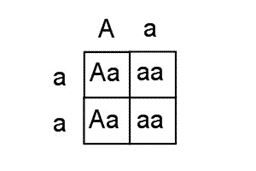The number of protons in an atom’s nucleus is also the atomic number of the atom. In this case, we are told that there are 45 protons present and that the atomic mass is 64; however, when looking for the atomic number, we do not need the atomic mass. Consequently, the atomic number is 45.

In the Punnett Square pictured, two of the children have brown eyes(A) and carry the recessive green gene(a) = (Aa), while two of the children have green eyes (aa). There is a 50% chance these parents will produce offspring with brown eyes (Aa).
The spleen is part of the lymphatic system. Like the lymph nodes, it acts as a blood filter.
Deductive reasoning starts with basic premises that are assumed to be correct, and draws a specific logical conclusion. It often follows the logic: A ➞ B, C ➞ A, therefore C ➞ B. (C) might be tempting, but is an example of inductive reasoning. (A) and (B) are logically flawed.
Disc herniation occurs when the inner core of a disc in the spine leaks out through the outer portion of the disc. This type of spinal injury is usually caused by an injury to the back and/or spine. Whiplash suffered from a minor impact could potentially cause a herniated disc.
The somatic nervous system controls voluntary actions, while the autonomic nervous system functions primarily below the level of consciousness, to control functions such as digestion, heart rate, respiratory rate, perspiration, salivation, swallowing, and breathing. The central nervous system consists of the spinal cord and brain.
During photosynthesis, water and carbon dioxide are absorbed by the plant and converted to glucose and oxygen.
Advertisement
Since the frog is inside the triangle, and the key indicates the triangle represents amphibians, it is logical to conclude that the frog is a type of amphibian.
While all the amphibians are located inside the “circle” of vertebrates, there is nothing to indicate that ALL vertebrates are amphibians.
Cytokinesis happens after telophase and it is the splitting of one cell into two. In plants it involves the formation of a cell plate whereas in animals it involves the formation of a cleavage furrow.
The information in DNA is stored as four nucleotides: adenine (A), guanine (G), cytosine (C), and thymine (T). The nucleotides adenine and guanine are classified as purines, while thymine and cytosine are classified as pyrmidines. Purines contain 2 carbon nitrogen ring bases and pyrimidines contain 1 carbon nitrogen base. These nucleotides can be easily remembered with the mnemonic, ‘GCAT PuPy PuPy,’ where ‘G’ and ‘A’ match up with ‘Pu’ (purine) and ‘C’ and ‘T’ match up with ‘Py’ (pyrimidine). RNA replaces thymine with uracil (U) and can be recalled as ‘GCAU PuPy PuPy.’
The thermosphere is the highest level of atmosphere before the exosphere, in which the atmosphere’s molecules drift into space.
The parenchyma of an organ consists of that tissue which conducts the specific function of the organ and comprises the bulk of the organ. It is not one of the four basic types of tissue: epithelial, nervous, connective, and muscle.
The stomach is above the small intestine. The word “superior” in anatomy means “upper” or “above.”
Advertisement
A cell undergoes mitosis to split into two identical copies of the parent. Mitosis’ first phase results in the division of two cells with the same genetic makeup as their parents. Mitosis results in the formation of two diploid cells, which have two copies of each chromosome.
The hippocampus is the site of memory storage. The medulla oblongata is involved in involuntary controls, the corpus callosum is involved in connections between the two lobes and in emotions and the Pituitary gland is an endocrine organ.
Meiosis is a two-step process, and the four cells that result each have half the normal genetic material of the original cell.
Ionic bonds involve the donation of and acceptance of electrons. Covalent bonds involve sharing electrons. Polar bonds describe electronegativity differences. Magnetic bonds are not chemical bonds.
As the number of molecules of air increases in a given volume, the mass of air also increases. As the mass of air in the given volume increases, its density also increases.
A 60% NaCl solution would be made by dissolving 60 g of NaCl in slightly less than 100 mL of water, and then increasing the volume of the solution to the final 100mL of water. If we had 200 mL of a 60% NaCl solution, then there would be 120 g of NaCl dissolved in the solution.
For a chemical reaction to be balanced, the amount of reactants must be the same as the amount of products. As there are 24 total carbons in the reactants, there should also be 24 carbons in the products.